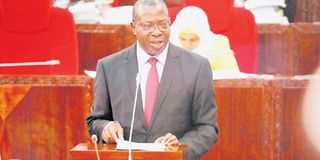How government plans to pay debt

Minister for Finance and Planning, Dr Philip Mapngo presents his ministry 2018/2019 budget eximate in Dodoma yesterday. PHOTO|EDWIN MJWAHUZI
What you need to know:
The Finance and Planning minister, Dr Phillip Mpango, said here yesterday that the government will spend a total of Sh10 trillion to service the debt during the 2018/19 financial year.
Dodoma. At least Sh64 in every Sh100 that the Tanzania Revenue Authority (TRA) will collect during the 2018/19 financial year will be spent on debt payment, available data show.
The Finance and Planning minister, Dr Phillip Mpango, said here yesterday that the government will spend a total of Sh10 trillion to service the debt during the 2018/19 financial year.
According to data, produced by TRA in April, the taxman had collected a total of Sh11.78 trillion during the first nine months of the current financial year.
This is equivalent to an average collection of Sh1.3 trillion per month. The Sh10 trillion - budgeted for debt payment during the 2018/19 financial year - translates into a monthly payment of Sh833 billion, which is equivalent to 64 per cent of the Sh1.3 trillion that TRA collects in a month.
However, Dr Mpango told the parliament in Dodoma yesterday that a debt sustainability analysis, which was conducted last November, showed that the debt was sustainable.
“The ratio of the government debt to the Tanzania’s Gross Domestic Product (GDP) stood at 34.4 per cent as of June 2017 against a threshold of 56 per cent,” he said.
As for the foreign debt, Dr Mpango said it stands at 19.7 per cent of the GDP against the threshold of 40 per cent.
Measured as a percentage of the country’s export earnings, Dr Mpango said, Tanzania’ foreign debt stands at 81.8 per cent of the exports against the threshold of 150 per cent.
Despite the fact that the debt is sustainable, Dr Mpango said the government was doing everything possible to maintain it within manageable levels, adding that borrowed funds will be injected into projects that will stimulate economic activities.
He said the debt sustainability analysis shows that Tanzania spends only 9.3 per cent of domestic revenues in servicing the foreign debt against the threshold of 20 per cent.
Members of Parliament (MPs) said the government requires to re-evaluate the debt, insisting that it was causing stress when it comes to implementation of development projects.
Presenting views of the parliamentary committee on the budget, the committee deputy chairman, Mr Jitu Soni, said it was worth noting that the national debt rose by 16.2 per cent in 12 months from March 2017 to March 2018.
Some MPs were concerned with the government’s shifting preferences from concessional to non-concessional terms of borrowing lately.
“We are told the debt is sustainable, but it remains a huge burden for Tanzanians and especially due to the fact that we are now shifting to non-concessional borrowing terms,” said Mr Peter Msigwa (Iringa Urban - Chadema).
He said it was largely due to debt servicing that almost every ministry has received less than half of the 2017/18 budget that the parliament had approved for their various development projects.




